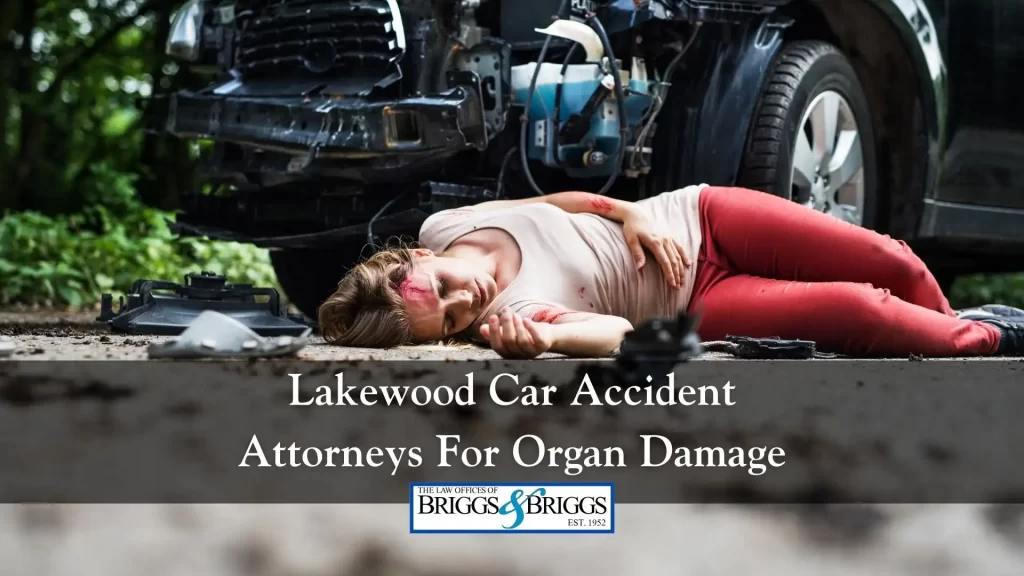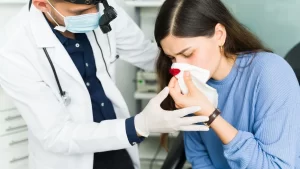 If you sustained organ damage in a car crash due to someone else’s negligence, contact The Law Offices of Briggs & Briggs immediately. You might be entitled to compensation from the at-fault driver.
If you sustained organ damage in a car crash due to someone else’s negligence, contact The Law Offices of Briggs & Briggs immediately. You might be entitled to compensation from the at-fault driver.
A car accident can lead to severe injuries. Organ damage is common when the body experiences violent forces from the impact of the collision. An internal injury might not be noticeable in the immediate aftermath of a car accident because it can take days or weeks for symptoms to appear. Diagnosing organ damage is challenging and requires a thorough examination by a qualified doctor.
The Lakewood car accident attorneys of The Law Offices of Briggs & Briggs understand how traumatic a car crash can be. Organ damage can lead to multiple complications and be fatal if left untreated. We have represented clients in car accident cases since 1952. Let us help you fight for the justice and compensation you deserve.
Call us at (253) 588-6696 for your free consultation today to learn more about what we can do for you.
Why Organ Damage Occurs in Car Accidents
Vehicles in motion have significant force and momentum. Even cars traveling slowly can cause severe injuries and property damage if they crash. When a car collides with another vehicle or fixed object, the extreme forces and momentum transfer to the driver and passengers. The human body can’t absorb the sudden impact without getting hurt.
Internal injuries result from the pressure and trauma placed on a person’s body during a collision. Although airbags can save lives, they can also cause organ damage. They deploy at high rates of speed in front of the chest and abdomen. Blunt force trauma from the collision and the airbags can injure the lungs, heart, and other organs.
Anyone who doesn’t wear a seatbelt can be ejected from the car. Landing on the hard pavement or getting run over by another vehicle can rupture a spleen, damage the kidneys, or break a rib, which can puncture a lung.
Different parts of a car can also cause internal injuries. A driver might hit their head on the steering wheel, leading to a traumatic brain injury. A locked seatbelt can tighten around a passenger’s chest, damaging the heart or lungs.
Common Types of Organ Damage
Numerous circumstances can lead to a car accident. The body contains many organs, so organ damage is a common injury. The most common organs affected during car crashes include:
- Liver – The sudden change in momentum from two cars colliding can cause a tear or laceration in the liver. Liver damage can also occur if an object penetrates the skin and pierces the organ.
- Kidney – The kidneys are in the lower part of the back. Typically, injuries result from blunt force trauma to that area. Kidney damage can be permanent and lead to kidney failure. When that happens, dialysis and a transplant are necessary.
- Brain – A violent blow or bump to the head during a car accident can lead to a traumatic brain injury (TBI). A penetrating injury to the head can also cause a TBI. Brain damage interferes with a person’s normal faculties. It could be permanent and cause significant physical or mental impairments.
- Lungs – Lung damage commonly occurs when a rib fractures and punctures the lung. A punctured lung can collapse, sending air into the chest cavity. Breathing is more challenging because the surrounding air pressures the lungs, preventing them from expanding normally.
- Abdominal organs – Trauma to the abdominal area can bruise, tear, or rupture the small bowel, colon, spleen, pancreas, or diaphragm. A crushed stomach can cause the abdominal aorta, the main blood vessel that supplies blood to the abdomen, to rupture. It can be fatal without prompt and adequate medical care.
Common Warning Signs of Organ Damage
The symptoms you experience after a car accident depends on the affected organ and the type of damage. The most common signs of internal organ damage include:
- Trouble swallowing
 Severe headache
Severe headache- Vomiting and nausea
- Inability to focus
- Loss of consciousness
- Dizziness
- Shortness of breath
- Abdominal pain
- Slurred speech
- Bleeding from orifices, such as the nose, anus, mouth, or ears
- Fatigue and lethargy
- Loss of coordination and balance
- Tightness in the chest
- Numbness or weakness on one side of the body
- Tingling in the limbs
- Difficulty writing
- Distorted hearing or blurry vision
Compensation for Organ Damage in a Car Accident
You can file an insurance claim or lawsuit if someone else is at fault for a car crash resulting in injuries. The compensation you receive might cover the following:
- Pain and suffering
- Surgery, prescriptions, hospital stays, and other medical expenses
- Lost wages
- Lost earning capacity
- Mental anguish
- Disability or disfigurement
- Cost of obtaining household services
- Inconvenience and humiliation
- Car repair or replacement costs
You might be able to pursue a wrongful death case if your loved one died from organ damage in a car accident. Only the personal representative of their estate can file a wrongful death lawsuit. The financial award recovered might compensate you for:
- The value of lost household services the deceased would have provided
- Final medical bills
- Burial and funeral expenses
- Loss of the deceased’s care, training, love, companionship, and affection
- Lost financial support, the deceased could have contributed to the family if they survived
A parent or guardian of a deceased child can receive compensation for:
- Loss of the child’s love, companionship, and emotional support
- Healthcare costs
- Destruction of the parent-child relationship
- Loss of the child’s financial support, services, and other financial losses
Statute of Limitations in a Car Accident Case
In Washington, the statute of limitations for car accidents allows a three-year timeframe to file a lawsuit. That means you have three years from the crash date to initiate your lawsuit against the at-fault party.
For a wrongful death case, the personal representative must file suit within three years of the deceased’s death.
Speak to an Experienced Lawyer Today
An injury to any internal organ can cause various problems. Treatment is necessary to repair the damage and manage symptoms. Some people can’t return to work or care for themselves. Organ damage can disrupt daily routines and diminish a person’s quality of life.
The Law Offices of Briggs & Briggs takes pride in helping injured clients get back on their feet after devastating accidents. You can depend on our team to create a strategy to hold the negligent party liable and seek the maximum compensation available.
If someone caused a car crash that resulted in organ damage for you or a loved one, call us at (253) 588-6696 for your free consultation now.
 Severe headache
Severe headache